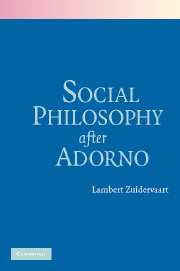Book contents
- Frontmatter
- Contents
- Preface
- Abbreviations
- Introduction: Thinking Otherwise
- 1 Transgression or Transformation
- 2 Metaphysics after Auschwitz
- 3 Heidegger and Adorno in Reverse
- 4 Globalizing Dialectic of Enlightenment
- 5 Autonomy Reconfigured
- 6 Ethical Turns
- Appendix: Adorno's Social Philosophy
- Bibliography
- Index
1 - Transgression or Transformation
Published online by Cambridge University Press: 18 December 2009
- Frontmatter
- Contents
- Preface
- Abbreviations
- Introduction: Thinking Otherwise
- 1 Transgression or Transformation
- 2 Metaphysics after Auschwitz
- 3 Heidegger and Adorno in Reverse
- 4 Globalizing Dialectic of Enlightenment
- 5 Autonomy Reconfigured
- 6 Ethical Turns
- Appendix: Adorno's Social Philosophy
- Bibliography
- Index
Summary
Insofar as a social function can be predicated for artworks, it is their functionlessness. Through their difference from a bewitched reality, they embody negatively a position in which what is would find its rightful place, its own.
Adorno, Aesthetic TheoryThe account of autonomy in Adorno's aesthetics hinges on the dysfunctional social function of authentic artworks. This account marks a theoretical passageway both to his critique of the culture industry and to his qualified defense of modern art. Neither the critique nor the defense makes sense in isolation from larger themes in Adorno's social philosophy. Let me show this by briefly summarizing his approaches to the culture industry and to modern art.
Adorno's critique of the culture industry has three levels, as Deborah Cook has demonstrated: an aesthetic thesis about the formulaic character common to products of the culture industry, an economic thesis about the commodification of culture, and a psychological thesis about narcissistic tendencies in late capitalist societies. In my view, these levels interconnect through the strong links Adorno forges among three different concepts of autonomy: (1) the internal and self-critical independence of the authentic work of art; (2) the relative independence of (some of) high culture from the economic system; and (3) the autonomy of the self as a political and moral agent.
- Type
- Chapter
- Information
- Social Philosophy after Adorno , pp. 16 - 47Publisher: Cambridge University PressPrint publication year: 2007



